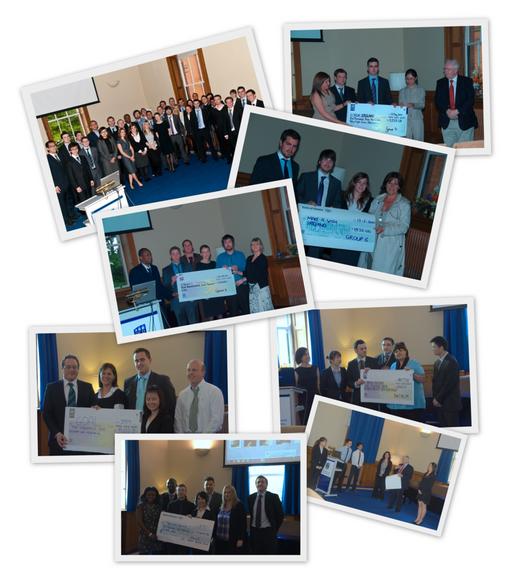






As one of the final modules in your programme, the activities you will undertake are aimed at synthesising previous materials covered (project management tools, techniques & approaches) in a set of experiential practical assignments designed to facilitate the application of these skills & knowledge areas to help you further master your abilities. By the end of this module, you will have three pieces of practical work to add to your portfolio as tangible demonstrations of your abilities to potential employers.
Have completed a charity project engagement & raised funds, awareness &/or built capability for your chosen charity – portfolio piece 1.
Experienced the reality of “messy” projects that don’t always go according to plan.
Planned, executed, and reflected on a real project with measurable deliverables that will make a difference.
Developed your own experience, abilities, and awareness of working in the non-profit sector.

Understand why the SDGs are important for modern project managers

Understand why the SDGs are critical focuses on global & local community engagements
Have completed a project aligned with one or more of the SDG’s –portfolio piece 2.
Co-researched & co-created a report on the SDG’s – portfolio piece 3.
Have utilised the Design Thinking framework in a real project

Have understood and applied Objectives & Key Results (OKRs) in setting up measurable outcomes for your project
Reflected on your experiences during the module.
Taking student feedback from previous years into account, this module is presented in a somewhat different way from many of the previous modules in the programme. For 2023 we are trying this as a fully online module.


The assessed projects will take each of you a considerable amount of time for planning, execution and documenting your processes. Because of this, the classroom-based component of this module has been cut back to allow you more time within the expected 200 hours of engagement time for the module to focus on the experiential components.
Self-directed learning is a key aspect of study at Master’s level and also outside of college in the workplace. Your ability to direct your own activities and those of teams you are part of, towards the achievement of deliverables on time, and to scope should be well developed by this stage of the programme.



The ECCSR model is one I developed to act as a focus for project teams when engaging in any project. It is informed by many years of both practical and academic learnings in the project environment drawn from engagements in corporate, civil service and non-profit organizations.

When creating the various stages of a project, bearing the different aspects of this model in mind can serve to ensure that projects are aligned with current societal values and imperatives.
The model is explored in my book "Project Management made easy... the ECCSR approach" available from Amazon at https://amzn.to/3mEAMeZ



Each group will submit to BrightSpace a project plan by (date TBC) @ 5pm (5% of module grade):
A 2-page project proposal outlining the objective of the project, reasons for why charity was chosen, tentative plan of action, estimated revenue generated, potential risks, & contingency plan

Project team charter


Project implementation plan
Your final report (submitted via BrightSpace on or before 5pm on (date TBC) - 40% of module grade) will include at least:

• Project documentation
• Work breakdown structure
• Project schedule
• Risk management process
• Stakeholder management process
• Correspondence with stakeholders
• Meeting agendas and minutes
• Promotional material
• Project financial summary
• A 1 page letter from each student (presented as part of a collaborative CANVA document) to next year ’ s students to give them advice and a head start in planning, managing and executing their projects
The professionalism of the planning, monitoring, control, and execution of the project
Application of project management tools and techniques
Professionalism, design, layout and accessibility of the project report
Critique and self-assessment of the project by the team
Grading of the project, will assess the following issues : HAVE
ENJOY
"Amounts raised form no part of the grading criteria"
You also need to complete the following 3 components as part of your assignment.Non-completion of any of these will impact your grade.

Survey 1 – Pre-assignment questions – an individual link will emailed out to each of you.
The letter to next year’s students mentioned in the brief above should be put into the CANVA template - Joe will give you a link for this. Each team member should add 1 page of thoughts, hints and tips, which will count towards the 40% assignment grade Your name & photo should appear at the top of your page…

Survey 2 – Post assignment questions – the link will be posted on Brightspace at the end of the module.


You have 100 hours (per person involved) to complete this assignment
Linking your work with one or more of the 17 UN Sustainable Development Goals, make a difference:


Make the world a better place.
Make a positive change
Make someone ’ s life better
Plan, execute & implement a measurable, positive change Doesn’t have to be earthshattering, it can be small, but it has to make a positive, measurable change.
Present your project as you see fit You can work in pairs or as individuals.

by (date TBC) @ 5pm
By the end of the assignment, you should:
Know about the 17 UN sustainable development goals

Understand why the SDGs are critical imperatives for projects in business
Have utilised the Design Thinking framework in a real project

Have understood and applied Objectives & Key Results (OKRs) in setting up measurable outcomes for your project
By completing this assignment, you will:
Enhance your research skills
Synthesise your knowledge of:
Project management
Innovation
Sustainability
Performance measurement
Further develop your communications and presentation skills

Make positive change to the world around you
Add to your portfolio of work
Process - 15% – you must show how you used the Design Thinking Framework to plan & run your project. Clear voice of the customer / empathy mapping must be evidenced. A top submission will show in detail how you utilised the different stages of Design Thinking to run your project and precisely how this was done
Impact – 15% – you must show how your project will make achievable, measurable, positive change using Objectives & Key Results (OKRs).
Creativity – 15% – Your project must be focussed on one or more of the 17 UN SDG’s – which ones you link to should be identified clearly. Your project should demonstrate creativity, originality and practicality
Presentation – 10% - You must present your work in an engaging, professional and attractive manner. Submissions can be in any combination of electronic media (document, presentation, video, audio) There is no word count for this assignment
Charity projects updates
Capstone projects check-in
MAD117 individual/pairs assignment
Team work for module - split the class into 17 small teams – assign each team to 1 SDG to present a 15minute slot during session 3.
Slide deck 1 – Module intro to sustainability
The Design Thinking Process – the Stanford design sprint
7th June 2023 online
For all 4 sessions 10am - 4pm Dublin Join Zoom Meeting
https://ucdie zoom us/j/66588588 270
Meeting ID: 665 8858 8270

Ron Berger video on Student Excellence Business Innovation and Design Thinking slide decks
A review of OKRs
Homework - Team SDG presentation preparation for session 3
8th June 2023 online
Introduce the SDG and your curated set of resources in a 15-minute Zoom presentation which is to be presented by all the team members
Prepare 5 pages for your assigned SGD within the shared CANVA template (see link HERE) with a curated set of useful links to resources about this specific SDG for the rest of the class & readers of the report. This will be incorporated into a single SDG’s report document covering all 17 SDG’s as a publication of this year's Smurfit MSc in Project Management class.

Teams - Go through the 17 SDG’s and explore each one for 15 minutes with each team’s presentation…
These presentations will be recorded, put up on a private Youtube playlist and linked to in the SDG document as a multimedia artefact of your module

After classes - Joe will do a final edit on the 17 team SDG CANVA report and publish this as a single SDG Resources report for the class to reference & use in their online portfolios. This document will be made publically available as an example of your amazing work...

Some project examples that have made a difference
Project Planning – breakout discussions
Begin planning your MAD117 projects
Create a project plan for the next few weeks of work
Using OKR’s, Identify the measures you will employ to show the difference your project makes
20th June 2023 online
21st June 2023 online
Individuals/pairs present their idea for 2 mins and get 2 mins of positive ideas from another person/pair.
Work should demonstrate : Knowledge, understanding, application, analysis, synthesis, evaluation. Simply working hard does NOT get you a top grade!
A comprehensive, highly-structured, focused and concise response to the assessment task, consistently demonstrating:
An extensive and detailed knowledge of the subject matter.
A highly-developed ability to apply this knowledge to the set task
Evidence of extensive background reading
Clear, fluent, stimulating and original expression.
Excellent presentation (spelling, grammar, graphical) with minimal or no presentation errors.
A deep and systematic engagement with the assessment task, with consistently impressive demonstration of a comprehensive mastery of the subject matter, reflecting:
A deep and broad knowledge and critical insight as well as extensive reading. A critical and comprehensive appreciation of the relevant literature or theoretical, technical or professional framework.
An exceptional ability to organise, analyse and present arguments fluently and lucidly with a high level of critical analysis, amply supported by evidence, citation or quotation
A highly-developed capacity for original, creative and logical thinking
A thorough, substantial and well-organised response to the assessment task, demonstrating:
A broad knowledge of the subject matter
Considerable strength in applying that knowledge to the task set
Evidence of substantial background reading
Clear and fluent expression
Quality presentation with few presentation errors.
A thorough familiarity with the relevant literature or theoretical, technical or professional framework.

Well-developed capacity to analyse issues, organise material, present arguments clearly and cogently well supported by evidence, citation or quotation
Some original insights and capacity for creative and logical thinking.

An adequate and competent response to the assessment task, demonstrating:
Adequate but not complete knowledge of the subject matter
Omission of some important subject matter or the appearance of several minor errors
Capacity to apply knowledge appropriately to the task albeit with some errors
Evidence of some background reading
Clear expression with few areas of confusion
Writing of sufficient quality to convey meaning but some lack of fluency and command of suitable vocabulary
Good presentation with some presentation errors.
An intellectually competent and factually sound answer with, marked by:
Evidence of a reasonable familiarity with the relevant literature or theoretical, technical or professional framework
Good well developed arguments, but more statements of ideas.
Arguments or statements adequately but not well supported by evidence, citation or quotation.
Some critical awareness and analytical qualities
Some evidence of capacity for original and logical thinking
An acceptable response to the assessment task with:
Basic grasp of subject matter, but somewhat lacking in focus and structure
Main points covered but insufficient in detail
Some effort to apply knowledge to the task but only a basic capacity or understanding displayed.
Little or no evidence of background reading
Several minor errors or one or more major error.
Satisfactory presentation with an acceptable level of presentation errors
An acceptable level of intellectual engagement with the assessment task showing:
Some familiarity with the relevant literature or theoretical, technical or professional framework.


Mostly statements of ideas, with limited development of argument
Limited use of evidence, citation or quotation.
Limited critical awareness displayed
Limited evidence of capacity for original and logical thinking